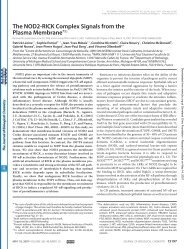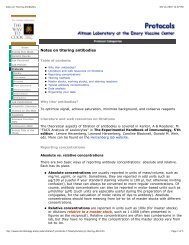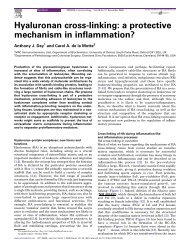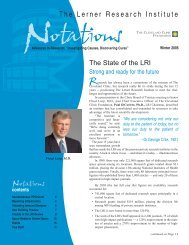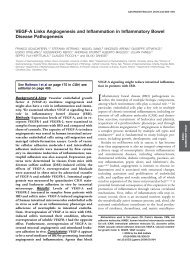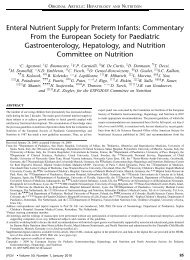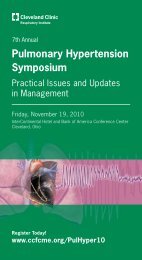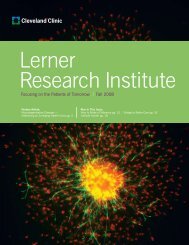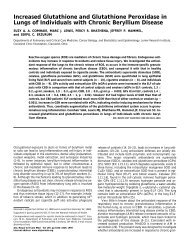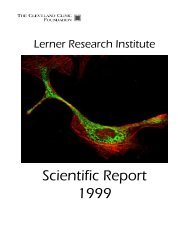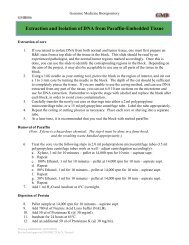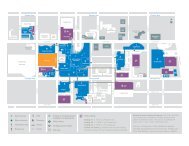Scientific Report 2003-2004 - Cleveland Clinic Lerner Research ...
Scientific Report 2003-2004 - Cleveland Clinic Lerner Research ...
Scientific Report 2003-2004 - Cleveland Clinic Lerner Research ...
- No tags were found...
Create successful ePaper yourself
Turn your PDF publications into a flip-book with our unique Google optimized e-Paper software.
THE GUDKOVLABORATORYPROJECT SCIENTISTSMikhail Chernov, Ph.D.Katerina Gurova, Ph.D.Elena Komarova, Ph.D.Asoke Mal, Ph.D.RESEARCH ASSOCIATESLyudmila Burdelya, Ph.D.Julia Kichina, Ph.D.Roman Kondratov, Ph.D.Jason Tasch, Ph.D.POSTDOCTORAL FELLOWSAnna Khodyakova, Ph.D.Vadim Krivokrysenko, Ph.D.GRADUATE STUDENTSAlexander BoikoJason HillPratibha KhanduryAndrei KomarovInna ShyshynovaAatur SinghiRESEARCH TECHNOLOGISTSKris GoodrichAnna KondratovaVISITING FELLOWSCatherine Burkhart, Ph.D.Chengyuan XueCOLLABORATORSVladimir Botchkarev, M.D.,Ph.D. 1Michael Cole, Ph.D. 2Elena Feinstein, M.D., Ph.D. 3Michelle Haber, Ph.D. 4Alain Jaqcemin-Sablon, Ph.D. 5Hioaki Kiyokawa, Ph.D. 6Murray Norris, Ph.D. 4Varda Rotter, Ph.D. 71Boston Univ., Boston, MA2Princeton Univ., Princeton, NJ3Quark Biotech, Inc., Nes Ziona,Israel4Children’s Cancer InstituteAustralia for Medical <strong>Research</strong>,Sydney, Australia5Institut Bergonié, Bordeaux,France6Univ. of Illinois at Chicago7Weizmann Inst. of Science,Rehovot, IsraelThe Department of Molecular BiologyIdentifying and TargetingCancer-Related GenesMy laboratory explores functional gene anddrug discovery methodologies fordeveloping new strategies of cancertreatment and diagnostics.Novel Gene Discovery ApproachesWe use functional selection of expressionlibraries for identifying genes encoding prospectivedrug targets. A number of such genes havebeen selected by using the Genetic SuppressorElement (GSE) methodology, including newcandidate tumor suppressor (ING1), drugsensitivity (Falcor) or pro-apoptotic (SIRPα/SHPS-1) genes.One branch of our gene discovery programis devoted to isolating new viral and bacterialanti-apoptotic genes as potential leads to newcellular mechanisms controlling programmed celldeath. Thus, three anti-apoptotic proteins havebeen identified among polypeptides encoded bypoliovirus.Recently, we have developed a newfunctional genetic methodology, the Selection-Subtraction Approach (SSA), which allows adirect functional selection of growth-suppressiveor killing clones from expression libraries. Weconsider the SSA our major tool for genediscovery and are applying it to isolate novelcancer-related genes for future drug targeting.p53 in Cancer Diagnostics and TreatmentOur p53 studies are focused on the role ofthis tumor suppressor gene in response of normaltissues to the stresses associated with cancertreatment. We defined p53 as a determinant ofcancer treatment side effects; the new therapeuticconcept—targeting p53 for therapeutic suppression—wasjustified by isolating a small moleculep53 inhibitor that rescues mice from lethal dosesof gamma irradiation. Furthermore, analysis of amouse model of chemotherapy-induced hair losshas indicated that p53 plays a major role in thiscommon side effect, thus opening another areafor clinical application of p53 inhibitors.We also study the role of p53-dependentapoptosis and growth arrest and the interactionof p53 with other signaling pathways (TNF, Fas,heat shock, etc.) in determining its tumorsuppressor function. Analysis of mechanisms oftissue specificity of the p53 response resulted indevelopment of a new rational approach to newcancer markers encoded by the genes that areunder the negative control of p53. We found thatone of the most important cancer markers,prostate specific antigen (PSA), belongs to thiscategory and initiated a large-scale screening forother candidate markers sharing similar properties.Drug Discovery ProgramOur drug discovery program involvessearching for new p53 inhibitors and testing theirpotential therapeutic applications for reducingcancer treatment side effects and possibly otherpathologies involving p53-inducing stresses. It isbased on the creation of new cell-based readoutsystems and high-throughput screening ofchemicals with the desired biological properties.We are also isolating a new class of smallmolecules acting as modulators of multidrugtransporters that can greatly change the patternof cross-resistance, including the ability toenhance their activity against certain compounds.The molecular mechanisms of activity of newlyisolated compounds are being addressed, as aretherapeutic fields for their practical applications.Komarov, P.G., Komarova, E.A., Kondratov,R.V., Christov-Tselkov, K., Coon, J.S., Chernov,M.V., and A.V. Gudkov (1999) A chemicalinhibitor of p53 that protects mice fromthe side effects of cancer therapy. Science285:1733-1737.Kondratov, R.V., Komarov, P.G., Becker, Y.,Ewenson, A., and A.V. Gudkov (2001) Smallmolecules that dramatically alter multidrug resistancephenotype by modulating the substratespecificity of P-glycoprotein. Proc.Natl. Acad. Sci. USA 98:14078-14083.Gurova, K.V., Roklin, O.W., Krivokrysenko,V.I., Chumakov, P.M., Cohen, M.B., Feinstein,E., and A.V. Gudkov (2002) Expressionof prostate specific antigen (PSA) is negativelyregulated by p53. Oncogene 21:153-157.Zou, X., Ray, D., Aziyu, A., Christov, K.,Boiko, A.D., Gudkov, A.V. and Kiyokawa H.(2002). Cdk4 disruption renders primarymouse cells resistant to oncogenic transformation,leading to Arf/p53-independent senescence.Genes Dev. 16, 2923-2934.Neznanov, N., Neznanova, L., Kondratov,R.V., Burdelya, L., Kandel, E.S., O’Rourke,D.M., Ullrich, A., and A.V. Gudkov (<strong>2003</strong>)Dominant negative form of signal-regulatoryprotein-a (SIRPa/SHPS-1) inhibits tumor necrosisfactor-mediated apoptosis by activationof NF-kB. J. Biol. Chem. 278:3809-3815.Gudkov, A.V., and E.A. Komarova (<strong>2003</strong>) Therole of p53 in determining sensitivity to radiotherapy.Nat. Rev. Cancer. 3:117-129.Komarova, E.A., Neznanov, N., Komarov,P.G., Chernov, M.V., Wang, K., and A.V. Gudkov(<strong>2003</strong>) p53 inhibitor pifithrin alpha cansuppress heat shock and glucocorticoid signalingpathways. J. Biol. Chem. 278:15465-15468.Gurova, K.V., Rokhlin, O.W., Budanov, A.V.,Burdelya, L.G., Chumakov, P.M., Cohen,M.B., and A.V. Gudkov (<strong>2003</strong>) Cooperation oftwo mutant p53 alleles contributes to Fas resistanceof prostate carcinoma cells. CancerRes. 63:2905-2912.104



